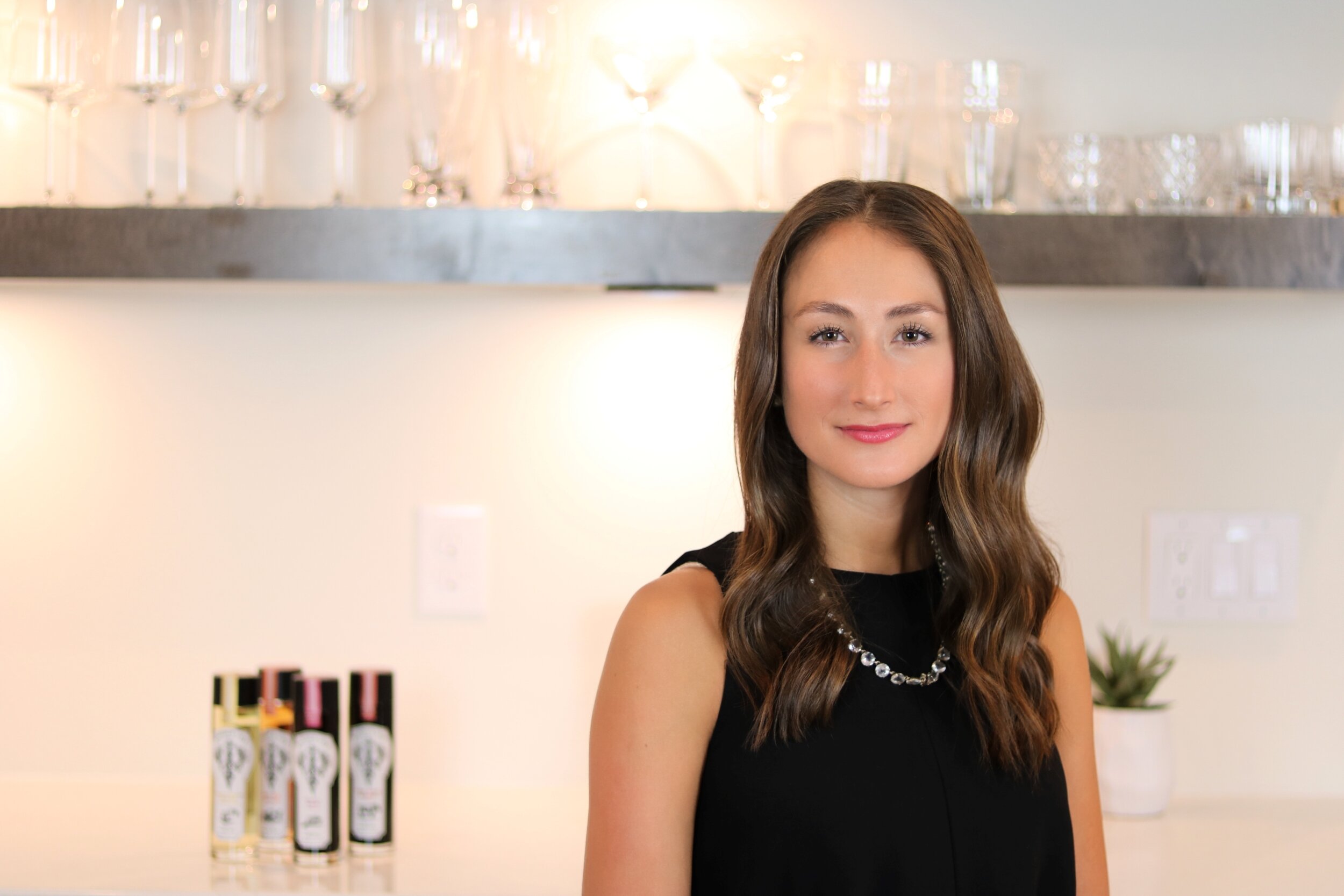At Home with Wander + Ivy's Dana Spaulding
For our series Closet Confidential, we interview interesting and uber-cool people in their homes wearing outfits from their closet. Culture & Style Editor ANNIE BLOJ interviews the owner of the wine company Wander + Ivy Dana Spaulding.
PHOTOGRAPHED BY ESTHER LEE LEACH
Annie Bloj: Dana, I’m so excited to speak with you and get to know you better. I have had the privilege of enjoying your line of wines, Wander and Ivy, at several events this summer. Naturally, I was curious about your story and I wanted to know more about how you got started with this project! You got your start, professionally, at JP Morgan first as an analyst and then moved your way up to Vice President. What drew you to that line of work, and what brought you to Denver?
Dana Spaulding: In college, I studied Economics and Finance and had the opportunity of interning at a variety of finance jobs in NYC. I was drawn to Private Wealth Management because I was building my finance and analytical skills while also developing my people/communication skills. It was definitely a grind, especially the first few years as an analyst, but I was constantly learning and growing.
JP Morgan really encourages mobility throughout the company. When my now-husband and I had the opportunity of getting promoted, he suggested that we explore other cities together. I was pretty set on San Francisco and immediately vetoed his Denver idea because I had never been (and assumed it was always snowing). He eventually convinced me to visit and I was sold pretty quickly. Beautiful weather, much cheaper cost of living, and a team of people that I was looking forward to working with. We took the leap knowing very few people here and said if we hate it, we'll make a change and go to business school. What was initially a two to three year stint has become a six year stay in a place we now call home.
AB: That story sounds very similar to my own! From what I’ve read, the Wander + Ivy origin story goes something like this: The concept came to you after you became “annoyed” with something that your husband said to you. Can you elaborate on this anecdote?
DS: It was a weeknight and I had cooked a big meal and wanted to celebrate something after work. I suggested that we open a bottle of a somewhat expensive bottle of wine. Gus said, “Are you really going to waste another bottle of wine?” I admit that I quickly got annoyed and said “Fine, no you’re right, I won’t open it.” I realized that more and more I was enjoying having a nice glass of wine one or two nights after work while he enjoyed a glass of beer or whiskey. I would then throw a portion of the bottle of wine down the drain a few days later after it spoiled.
After this, I started shopping for single-serve wine options but found that in general the market consists of low-quality wines, in very cheap packaging and there was no focus on natural, organic and transparent ingredients. That was the spark for me. I had always wanted to start my own business and follow in my clients’ footsteps (at that time I was in Denver managing wealth for successful entrepreneurs in the Food and Beverage space, among a few other industries). When I couldn’t find the products that I was looking for, I decided to create the product and thus started Wander + Ivy.
AB: Wander and Ivy is such a genius concept, one that seems to be obvious in hindsight. How did you know where to begin? Did you begin training for a life in wine?
DS: Thank you! My first step was obtaining my sommelier certifications. It took time and a lot of work but I was proud to have that knowledge as a starting place. I then built a business plan and ran it by many friends, founders, family, and industry experts. I received A LOT of feedback and was constantly tweaking the plan. After a few months, I knew that I would need to raise capital and set off on a 9-12 month journey of raising the capital to get this company off the ground.
AB: Organic, natural wines are gaining in popularity due to education in regards to what is added to wine to improve the look, feel and taste of what’s in your glass. How important was it to you that Wander and Ivy be sourced from organic, family-owned vineyards and how did you go about finding them?
DS: After learning about the pesticides and herbicides used on grapes and the many additives used in mass-produced wine, I knew that I wanted to focus on sourcing wines made from organic grapes and produced using sustainable practices. I believed that we would be delivering a cleaner, but still delicious product to consumers without the potentially harmful effects of pesticides and other additives.
We went through a long research, tasting, and negotiation process with vineyard partners and ultimately decided on four to launch with.
AB: Have you had any mentors in business and wine…. Or in both? Did your history at JP Morgan help you when setting up Wander + Ivy?
DS: Absolutely! I am very fortunate to have mentors across many industries. Female founders/CEO’s in Colorado have been some of my favorite mentors. Founding and growing a company is often a lonely journey so I find that it’s important to surround yourself with many supportive people along the way.
My career in Private Wealth Management absolutely helped me start Wander + Ivy. I was essentially building a business within JP Morgan. The sales cycle is quite long and competitive and you have the challenge of having to convince high net worth families that they should entrust you with their family wealth. It's a job where you hear 100 "no's" for every client you bring over the finish line. I developed strength, patience, and perseverance, which I’ve found to be particularly helpful when raising capital.
AB: What was the moment you decided to make wine your full-time job? So many of us wonder when to make the leap, what advice would you offer?
DS: I waited about 9 months after having the idea to leave my day job. I needed to take the time to research and map out my plan, share it with friends, family, and advisors, and just get the courage to leave a pretty lucrative and safe job. I also wanted to plan from a financial perspective. My husband and I talked a lot about what this would mean for our family and how we would save to make it happen. I would highly recommend that you take the time to think this piece through. Starting a company often means little or no salary and a chunk of personal investment into the company. Work on the new business for as long as you can still have a day job, but know that you really can’t fully dive into the business and commit until you make the full-time leap. I built the plan, saved, and eventually just knew that I wanted to build this thing before someone else did.
AB: The distribution of Wander + Ivy has grown seemingly quickly. There are many places you can purchase Wander and Ivy to take home or to try at a restaurants here in Colorado. You’ve also found a home for your wine in California and New York! How exciting is it for you and your team to see your hard work paying off?
DS: It is really exciting to see this brand grow. Probably like many other founders, it is hard for me to pause and take in the success to date. There always seems to be a challenge to focus on or a goal I’m working to achieve. One mentor a few months ago shared how impactful journaling and meditation has been for her. I have really tried to incorporate this into my life and I’ve found that it is a great time to reflect on the incredible things that our team has accomplished over the last two years.
AB: What is next for you and Wander + Ivy? How do you see the brand growing and what is inspiring you these days?
DS: Direct to consumer is a big focus of ours right now. I am excited to give our consumers the ability to ship our wines direct to their door and gift to friends and family. It’s a big undertaking in the wine industry but something that I am really excited about.
I am constantly inspired by other founders, from brand new company ideas to huge success stories. I am currently raising our next round of capital and am inspired by the women who have successfully raised significant amounts to grow their businesses. Women currently receive 2-3% of venture funds. It is frustrating that there is still such a huge gap, but it is motivating and inspiring to see the success stories and learn from them along the way.
Dana Spaulding: @wanderandivy
Photography: @estherleeleach
Interview: @anniebloj
Cherry Creek Fashion TV’s My Style Guide (To Wine) with Dana Spaulding











